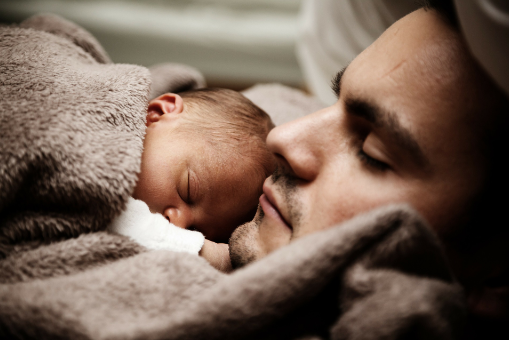LittleDot team of experts educating you for child's better heath
All articlesWhy children in hospital need parents? (or, can a child in hospital do without their parents?)

The mother and child form an inseparable unit: whatever happens to one strongly affects the other, which is why the pain and suffering of the parent (in early infancy, this is usually the mother) has a significant impact on the child’s health. The feeling of helplessness, leaving the child when they need you the most and the inability to fulfil the parental duty of protecting your own child creates a burden most parents find too heavy to bear.
The child’s very existence depends on others: without the help of those close to them, they cannot survive. Separation from parents therefore naturally causes a life-threatening fear. It seems absurd that the child in hospital is often perceived as being protected and that the whole situation is in their best interest: the illness will be cured, the child will be fed and cared for, and finally discharged to go home to their parents. A seemingly happy ending we witness every day in our hospitals. The widely held belief still persists that small children cannot comprehend what is happening around them and quickly forget everything. But what is really going on inside the child, in their world communicated via emotions? We can all agree that a small child’s understanding of what is happening and what is going to happen is very limited. They only feel that there has been a sudden change, that they are ill and that their parents are experiencing fear, worry and sorrow. The much-needed feelings of being safe and protected, of cheerfulness and faith in the child’s future are gone. In medical terms, this inflicts a deep emotional wound (more severe than the stress caused by physical pain or discomfort) on the child. The changing patterns of the child’s behaviour upon return home from the hospital and life-long memories of this event all bear witness to its traumatic nature.
Contemporary research into brain development suggests that this type of severe stress has a detrimental effect on health in adult age. Research shows that stress at an early age increases the chance of heart attack, violent behaviour in the family, depression and addiction in adult age. Increased stress in the first years of a child’s life increases these chances by 3 to 4 times.
The reasons behind such high levels of sensitivity to stressful events lie in the fascinating processes that remain hidden from both parents and those of us who try to tend to children’s health. At birth, the weight of the child’s brain amounts to only a quarter of the weight of an adult brain. During the first years, the brain is still “being born”: the brain cells are created, travel to their final destinations, become mature and interconnected, thus creating a complex network for transmitting stimuli. This process is partly determined by our genes, but is largely dependent on the stimuli from our surroundings: experiences of daily care and expressions of love. Without these experiences, development into a healthy adult is not possible. One might say that experiences are food for the brain. However, an overabundance of stimuli can also interfere with this process. For this reason, watching television during the first two or three years is not recommended since it exposes the child to an uncontrolled amount of stimuli, thus increasing the possibility of attention and concentration disorders, hyperactivity, reading and comprehension difficulties and depression at a later age. Stressful events, such as the feeling of one’s life being threatened, deeply interfere with these processes. Nowadays, it is possible to determine which specific chemical changes in the brain are triggered by stress. Contemporary diagnostic techniques enable us to see that such events can permanently alter the appearance of certain areas of the brain, changing the network architecture. The network itself becomes less dense as the activity of individual areas of the brain change.
When discussing this topic, we must address the issue of the child’s crying. In order to ensure their own survival at times of crisis, the child has an extremely effective mechanism which they can use to ensure help from others. This mechanism has been developed for thousands of years and we have all in some way become sensitive to the signal of a child crying. We feel uncomfortable and compelled to provide help and comfort. As a result of hormonal changes that take place in the mother during pregnancy and birth, receptors for the crying of her own child become especially sensitive. In fact, they are sensitive to such a degree that a mother will try to save her child without any regard for her own wellbeing. Objectively speaking, this is an extremely powerful stimulus: even in the first months of a child’s life, the loudness of crying can exceed 100 decibels. For comparison, this is equal to the level of noise created by a jackhammer used to drill through concrete! This example helps us to better understand the intensity of the parental impulse caused by the child’s crying.
Illness creates vulnerability, as the child requires increased care and parental presence; separation from the parents thus causes stress and a feeling of threat to life. Anti-stress self-preservation mechanisms are not sufficiently developed, which results in high levels of sensitivity to stress. On an emotional level, the child is in the process of creating an image of themselves and of the world around them, of how the world works and how they can communicate with their environment. A life-long feeling of self-confidence and trust is being created. Separation from parents damages the very basis of this process and can lead to low self-confidence, feelings of being misunderstood, inability to empathise, limited ability to work with others, and a lack of kindness later in life. Highly developed communities have recognised the importance of these events and therefore allow parents to stay at the hospital with their children, even in intensive care units. Parental presence has proven to have a positive influence on the restoration of health and recovery of the child. Think of how much warmth and love a newborn child weighing 700 g needs – as they lie in an incubator, attached to numerous tubes and probes, connected to a breathing machine and dependent on numerous diagnostic and therapeutic operations… In addition to its beneficial influence on the child’s recovery, parental participation in child care increases its quality and can help relieve hospital staff.
What does the Convention on the Rights of the Child say?
Unfortunately, separating the child from the mother typically occurs immediately after childbirth. The traumatic effect of this separation, the widely-accepted practice of feeding newborn babies with milk formula and tea, and disregard for the natural process of parental and child adaptation all violate the fundamental rights of the child and parents: the right not to be separated from the parents (Convention on the Rights of the Child, Article 9) and the right to be protected from wilful or unlawful interference with the private life of the child and family (Convention, Article 16). Undermining the foundations laid in the earliest and most vulnerable phase (emotional developmental disorders, stopping breastfeeding) is contrary to the child’s best interests (Convention, Articles 3 and 24, paragraph 2) and the obligations to put efficient and appropriate measures into effect to eliminate traditional practices that are prejudicial to the health of the child (Convention, Article 24, paragraph 3).
What to do?
It is highly unlikely that any society is characterised by such a high degree of wellbeing that everyone’s needs can be satisfied. In fact, the poorer the society, the more important it becomes to prioritise and protect the most vulnerable groups. As much as our own society declares children to be a group of special significance based on ethical, moral and economic standards, in reality, specific actions fail to sufficiently recognise how special, vulnerable and valuable they are. It is therefore crucial that all of us (all citizens, experts, local communities, the Government) work together towards creating optimal conditions for child growth and development. Enabling parents to stay with their children at the hospital is one small step we can and must take on the way towards achieving this goal. Recently, the Union of Associations “Our Children Croatia” took a giant collective stride with their action “Together for a Child’s Smile in Hospital”, aimed at acquiring folding chairs/recliners for parents, which take up little space and are appropriate for hospital rooms in paediatric wards.



